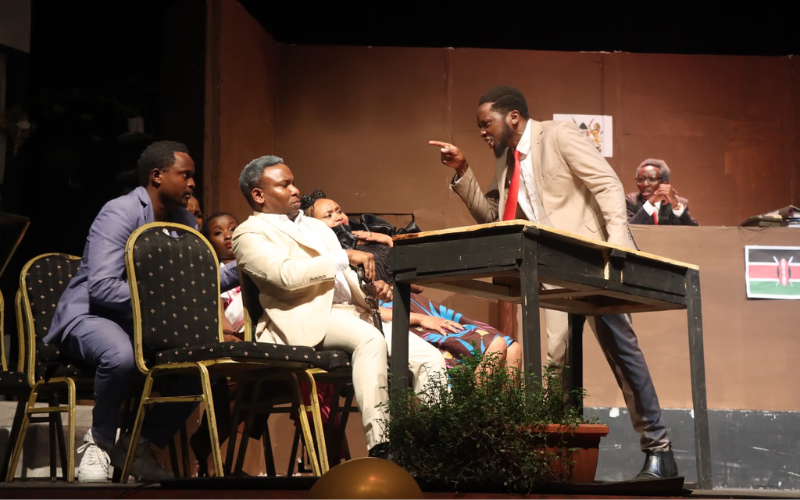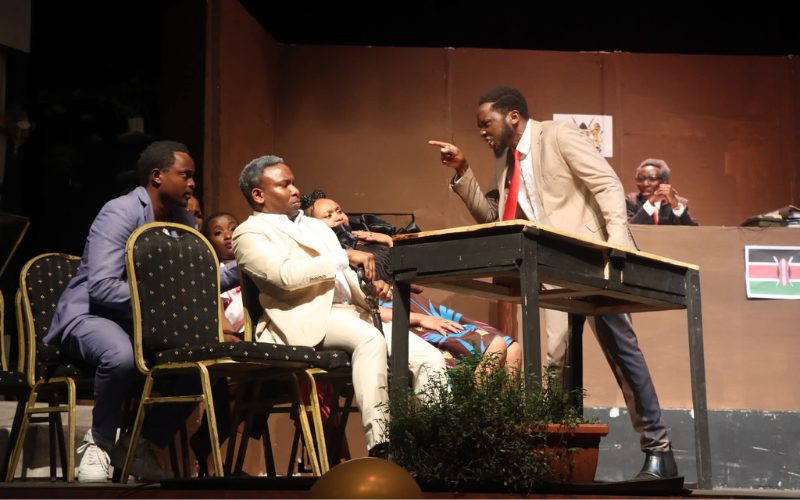At a time when the judiciary is facing corruption claims and delayed justice, playwright and director Martin Abuya is holding up a mirror to the judiciary with his play, The Last Confession.
Set for stage on November 1 and 2 at the Kenya National Theatre, the play is produced by Wreiner Mandu under Igiza Arts, which has, this year, staged Fractured Ties, Threads of Trust, and The Anointed Cartel, with the latter speaking truth to power.
“We’ve examined police brutality, religion, and the state before; it was only fair to now highlight the state of the judiciary and how its flaws affect the common people,” says Abuya.
In keeping up with its style of producing socially conscious works, The Last Confession looks at the flaws within the justice system that spill through powerful families.

The play revolves around Justice Daniel Odemba (played by Justin Mwanzia)—a revered, retiring Supreme Court judge. Lauded for efficiency, his flawless image is in jeopardy when a decade-old murder case surfaces, one that implicates him in a cover-up. Prosecutor Nyati (played by Rexie Kamau) interrupts his 70th birthday celebrations to face the crimes by the highest court in the land.
The Odemba family is close-knit, but cracks start to form as some are against the judge’s actions while many are in support of them for their self-interests. Through their father’s influence, some have gotten ahead legitimately while others through corruption. When the past comes crashing down, they realise they are all affected.
The Last Confession is constructed as a series of interrogations and revelations. Each family member, pressed by the relentless prosecutor and lawyer Sandra (played by Linda Kamuri), is compelled into a confession. In the shadows is Gabriel Mwanzo (played by Jeff Obonye), who is Odemba’s loyal handyman holding secrets.

The play is a critique of how justice operates in Kenya. He came up with the idea after watching recent court cases against powerful figures dropped once they get into power, while ordinary Kenyans are handed harsh sentences. He also drew inspiration from real judicial scandals and bribery allegations among senior judges.
“You see cases of corruption reported to the Judicial Service Commission, but nothing happens. We’re portraying how justice comes in two ways: for those who can afford it and for those who can’t. The law doesn’t apply equally,” he says.
The play is structured into three acts that end on a cliffhanger. It also incorporates suspense, symbolism, flashbacks and humour to tell this courtroom drama that merges humanity. To make it factual, Abuya consulted lawyer friends and immersed himself in legal jargon and courtroom procedures.

“I want to highlight how corruption in the judicial system affects the common people. We need a system that is independent, fair, decisive, and accountable,” he says.
Lead actor Justin Mwanzia shares that stepping into the role of Justice Odemba was exciting but also challenging since, at 26 years old, he is playing a 70-year-old character.
“My body movements had to be static, and my instincts had to be those of a Supreme Court judge. The theatre scene has few older actors available for such roles; therefore, younger actors are left to depict these roles,” he says.

Mwanzia also observed courtroom conduct in television dramas and studied mannerisms of individuals in the justice system to fully embody his role. The play changed how he thinks about justice.
“Before this role, I saw the justice system as black and white with open and shut cases. But through the play, you see how many grey areas exist and how justice seems far-fetched for some,” he reflects.
Mwanzia has recently acted in I Am Not a Simp by Dorion Productions, The Accidental Death of an Anarchist – which was adapted by Martin Abuya – and The Samaritan by John Lara.


